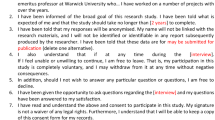Abstract
With reference to social constructivist approaches on citing behavior in the sciences, the hypothesis of acceleration of citing behavior after the millennium was empirically tested for a stratified random sample of exemplary psychology journal articles. The sample consists of 45 English and 45 German articles published in the years 1985 versus 1995 versus 2005 in high impact journals on developmental psychology, psychological diagnosis and assessment, and social psychology. Content analyses of the reference lists refer to the total number of references cited in the articles and the publication years of all references. In addition, the number of self-references, the number of pages, and the number of authors were determined for each article. Results show that there is no acceleration of citing behavior; rather, on the contrary, a significant trend is revealed for an increase in authors’ citing somewhat older references in the newer journal articles. Significant main effects point also at more citations of somewhat older references in the English (vs. German) journal articles as well as in articles on social psychology and psychological diagnosis (vs. on developmental psychology). Complementary analyses show that multiple authorships and the number of pages as well as the total number of references and the number of self-references increase significantly with time. However, percentage of self-references remains quite stable at about 10%. Some methodological and statistical traps in bibliometric testing the starting hypothesis are considered. Thus, the talk that has been circulating among psychology colleagues and students on the potential millennium effects on citing behavior in the sciences (which can, however, become a self-fulfilling prophecy) are not confirmed—at least for psychology journals.
Similar content being viewed by others
References
Bornmann, L., & Daniel, H.-D. (2008). What do citation counts measure? A review of studies on citing behavior. Journal of Documentation, 64, 45–80.
Burrell, Q. L. (2003). Predicting future citation behavior. Journal of the American Society for Information Science, 54, 372–378.
Cawkell, A. E. (1976). Documentation note. Journal of Documentation, 32, 53–58.
Cozzens, S. E. (1985). Comparing the sciences. Social Studies of Science, 15, 127–153.
Cozzens, S. E. (1989). What do citations count? The rhetoric-first model. Scientometrics, 15, 437–447.
Cronin, B. (1984). The citation process: The role and significance of citations in scientific communication. London, Great Britain: Taylor Graham.
Garfield, E. (1972). Citation analysis as a tool in journal evaluation. Science, 178, 471–479.
Garfield, E. (1979). Citation indexing: Its theory and application in science, technology, and humanities. New York, NY: Wiley.
Garfield, E. (1998). Random thoughts on citationology: Its theory and practice. Scientometrics, 43, 69–76.
Gilbert, G. N. (1977). Referencing as persuasion. Social Studies of Science, 7, 113–122.
Krampen, G., Becker, R., Wahner, U., & Montada, L. (2007). On the validity of citation counting in science evaluation: Content analyses of references and citations in psychological publications. Scientometrics, 71, 191–202.
Krampen, G., Montada, L., Schui, G., & Lindel, B. (2002). Zur Rezeptionsgeschichte von Fachliteratur aus der deutschsprachigen Psychologie in der amerikanischen Psychologie (et vice versa) [On the reception of publications from German language psychology in American psychology et vice versa]. Psychologie und Geschichte, 10, 84–113.
Marx, M. H., & Hillix, W. A. (1963). Systems and theories in psychology. New York, NY: McGraw-Hill.
Merton, R. K. (1957). Priorities in scientific discovery: A chapter in the sociology of science. American Sociological Review, 22, 635–659.
Merton, R. K. (Ed.). (1973). The sociology of science: Theoretical and empirical investigations. Chicago, IL: University of Chicago Press.
Wertheimer, M. jun. (1970). A brief history of psychology. New York, NY: Holt, Rinehart and Winston.
Author information
Authors and Affiliations
Corresponding author
Rights and permissions
About this article
Cite this article
Krampen, G. Acceleration of citing behavior after the millennium? Exemplary bibliometric reference analyses for psychology journals. Scientometrics 83, 507–513 (2010). https://doi.org/10.1007/s11192-009-0093-z
Received:
Accepted:
Published:
Issue Date:
DOI: https://doi.org/10.1007/s11192-009-0093-z




